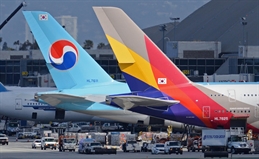
Korean Air said it would continue dialogue with the European Commission following its move to open an in-depth investigation into its proposed acquisition of Asiana Air.
"The European Commission (EC) has decided to go through a Phase 2 review of the Korean-Asiana merger," the South Korean flag carrier said following the European Commission announcement.
"Korean Air is confident that our merger will benefit our customers in the market and will continue to communicate with the EC and submit our remedies to address their concerns."
European Commission raises concern about merger
In a release on February 17, the European Commission raised concerns about the Korean Air-Asiana Air merger reducing competition.
"The European Commission has opened an in-depth investigation to assess, under the EU Merger Regulation, the proposed acquisition of Asiana by Korean Air. The Commission is concerned that the transaction may reduce competition in the markets for passenger and cargo air transport services between the European Economic Area ('EEA') and South Korea," the Commission wrote.
It noted, in particular, that Korean Air and Asiana are, respectively, the first and second largest airlines in South Korea, and both operate a network of domestic routes, short-haul routes in Asia as well as long-haul routes between South Korea and the rest of the world.
"The preliminary investigation indicates that the companies are strong and close competitors in the provision of passenger and cargo air transport services between the EEA and South Korea," the statement of the European Commission added.
It further said that based on its analysis, the merger could reduce competition in the provision of passenger transport services on four routes between South Korea and the EEA; the transaction could eliminate potential competition in passenger transport services between the EEA and South Korea; and the transaction could reduce competition in the provision of cargo transport services between Europe and South Korea.
"Korean Air and Asiana compete head-to-head in carrying cargo between the EEA and South Korea. Other competitors face regulatory and other barriers to expand their services and may be unlikely to exert sufficient competitive pressure on the merged entity," the European Commission added.
The EU Commission further said that despite the severe impact of the coronavirus pandemic in the passenger air transport sector, it is "unlikely" that Asiana and Korean Air would stop competing or be significantly less competitive absent the transaction.
"The Commission will, therefore, now carry out an in-depth investigation into the effects of the transaction to determine whether its initial competition concerns are confirmed," it said, adding that the Commission has 90 working days, until July 5, 2023, to take a decision.
Other countries approve Korean Air-Asiana merger
Prior to the comment from the European Commission, several countries and jurisdictions had already approved the planned combination of South Korea's Korean Air and Asiana Air.
On December 26, 2022, the airline received a greenlight for the merger from China's Ministry of Commerce.
The airline submitted business combination reports to the nine countries that require reporting on January 14, 2021.
Out of these nine countries, Korean Air has received approval from China, Korea, Turkey, Taiwan and Vietnam. The Thailand Competition Commission announced that the submission of a business combination report was not necessary.
From countries where reporting is arbitrary, Korean Air has received clearance from Singapore, Malaysia and Australia.
The Philippines, for its part, has confirmed that the business combination report was not required.
Following the comment from the European Comission, Korean Air is still awaiting business combination approvals from the US, and Japan, countries where reporting is mandatory, as well as the final approval from the UK, where reporting is arbitrary.



